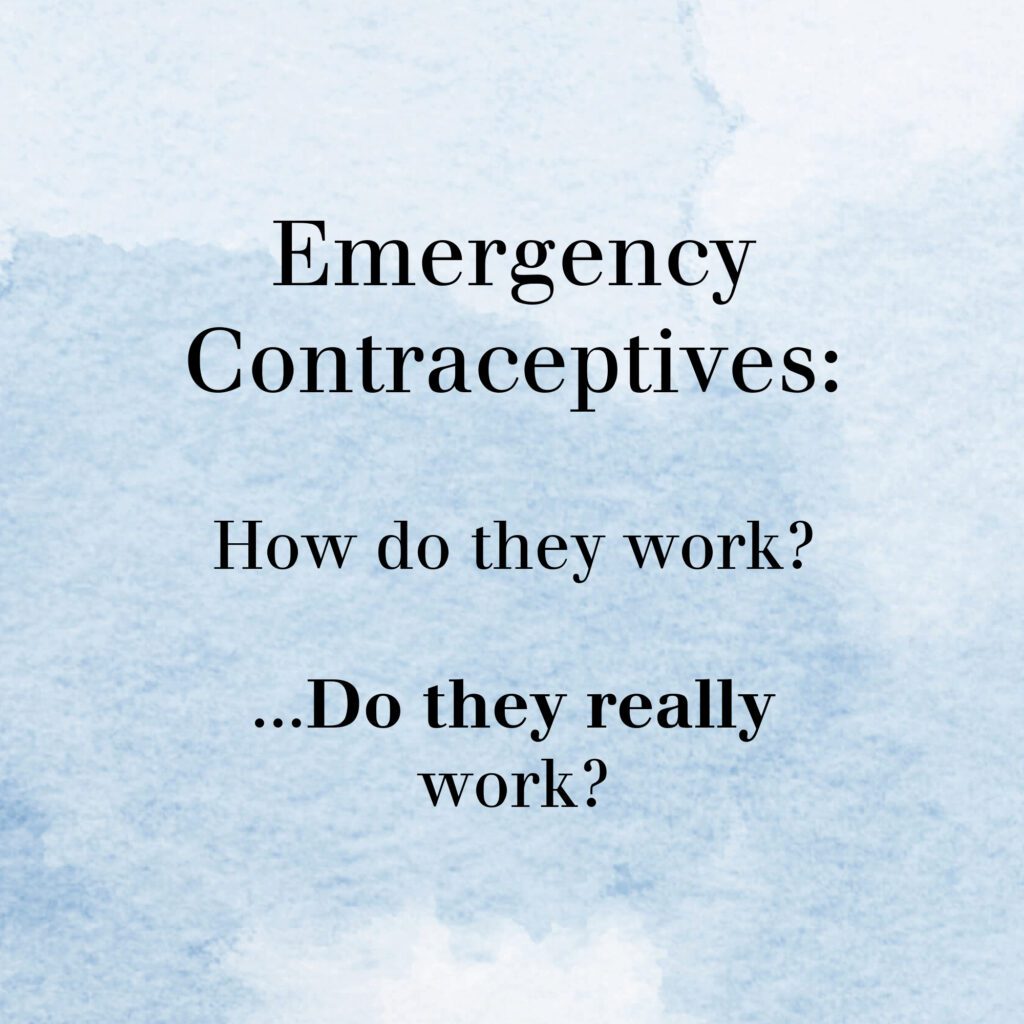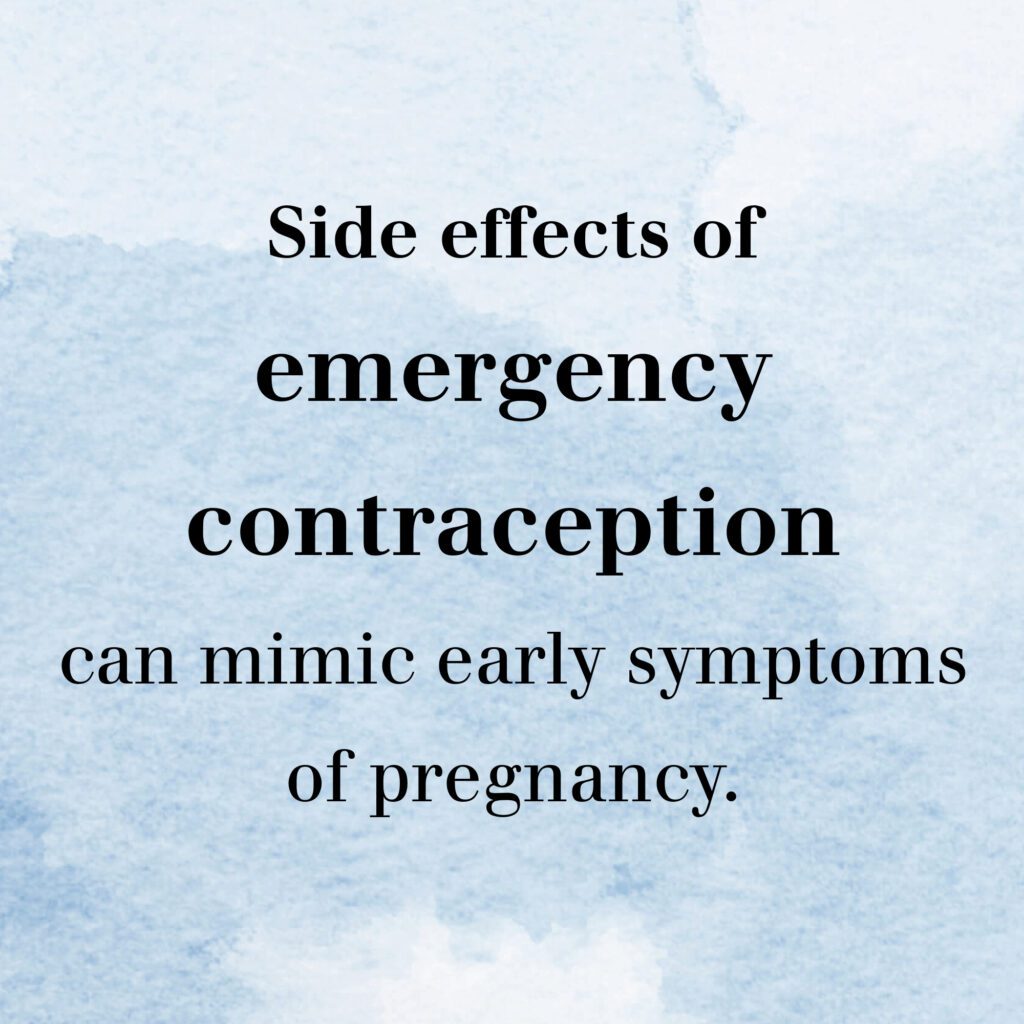Wondering, what exactly is emergency contraception, and does it really work? We’ll cover all the important facts you should know before using emergency contraception.
Today, many women are seeking alternatives to abortion when they learn they are pregnant- and didn’t plan to be.
The idea of a pill that prevents pregnancy after the fact seems like a great idea to women who are opposed to the abortion pill, for instance.
But the questions remain: how does it work; and does it really work?
The answers are actually not as clear-cut as you might think.

Disclaimer: the information on this site is intended for informational purposes only and should not constitute as medical advice or a substitute for medical care.
How emergency contraception works (in theory)
Today there are a few different forms of emergency contraception methods.
Emergency contraception in pill form, such as Plan B One Step, Next Choice, and Ella, to name a few, have to be taken within a short window of time. Depending on the type, this is anywhere from 24 hours to up to 5 days from the time of intercourse.
In some cases, a medical provider may prescribe a high dose of birth control pills, or an IUD that may act to prevent pregnancy.
How are these methods supposed to work, exactly? Medline Plus states:
“Emergency contraception most likely* prevents pregnancy in the same way as regular birth control pills:
- By preventing or delaying the release of an egg from a woman’s ovaries
- By preventing the sperm from fertilizing the egg “
However, all types of emergency contraception is stated to be most effective if taken within 24 hours.

Think you Might be Pregnant?
Contact the Pregnancy Resource Center of Mountain Grove for a Free Pregnancy Test.
*Note that medical professionals have repeatedly stated that these pills “most likely” prevent pregnancy by one of the two methods above. However, there are other studies that also state that emergency contraceptives can prevent a fertilized egg from implanting in the lining of the uterine wall. In that case, it is acting as an abortifacient: causing an abortion.
Contradicting data on effectiveness of emergency contraception
If you search for “How effective are emergency contraceptives”, you will get a wide range of answers from a wide range of medical sources and studies.
For instance, on the Plan B One-Step website, it states, “When used as directed, about 7 out of every 8 women who could have gotten pregnant did not become pregnant after taking Plan B.” This comes out to approximately 87.5% effectiveness.
Yale Health, however, states that “emergency contraception pills reduce the risk of pregnancy by approximately 75%”.
And yet, in a 2015 Emergency Contraception Review, it was found that “EC pills have not been shown to reduce pregnancy or abortion rates at the population level”.
Since emergency contraception was created with the purpose of reducing unintended pregnancy and therefore, abortion rates- it is interesting that across the board, it appears it has not been effective in reaching those goals.

In a research article in the American College of Obstetrics and Gynecology journal, the conclusion was that the numbers of prevented pregnancies after using emergency contraception may be overstated, “possibly quite substantially.”
Risks and drawbacks of emergency contraception
The most effective emergency contraception option appears to be the copper IUD. But it does come with risks.
For instance, with the copper IUD placement, there is risk of infection and perforation of the uterus.
Some studies have stated there is also evidence showing “the copper IUD also works by impairing implantation.” Meaning, a fertilized egg (new life) can still result- it just can’t implant in the uterine wall, and therefore, dies.
Researchers admit that “the mechanism of action are not fully understood”. Translation? They don’t fully know how the copper IUD works- whether it mainly prevents pregnancy (a fertilized egg), or causes a fertilized egg to die.
The difference to those who want to protect all human life, is important.
Side effects some women may experience with emergency contraception in general are: Headache, nausea and vomiting, abdominal pain, fatigue, dizziness and breast tenderness. Interestingly, these can also be early symptoms of pregnancy, which may create concern for someone taking these pills.

Frequent use of emergency contraception can result in increased side-effects such as menstrual irregularities.
In addition, it’s important to note that birth control, including emergency contraception, does not prevent sexually transmitted diseases, including HIV.
The reality of emergency contraception
One important question to ask beyond the risks and problems associated with emergency contraception methods is: How can I avoid becoming pregnant before I’m ready?
In reality, the only way to prevent an unexpected pregnancy is to avoid sexual intercourse until you are ready to potentially be pregnant. Because, of course, no birth control is 100% effective.

Need to Talk?
Contact the Pregnancy Resource Center to learn more about emergency contraception or other sexual health related topics.
Being in a stable, married relationship can not only create the greatest level of sexual satisfaction and intimacy between couples, but it creates the best conditions for overall happy, healthy families.
So rather than relying on emergency contraception, maybe there are changes you want to make for the future.
Comparing your current lifestyle versus your long-term goals can be the first step to living a life that is healthy and incredibly fulfilling.
Still have questions about emergency contraception? Chat with us via the widget on this screen, or text: 417-275-0095 to make an appointment at the Pregnancy Resource Center of Mountain Grove.
Read next:
Why am I feeling sad after an abortion?
